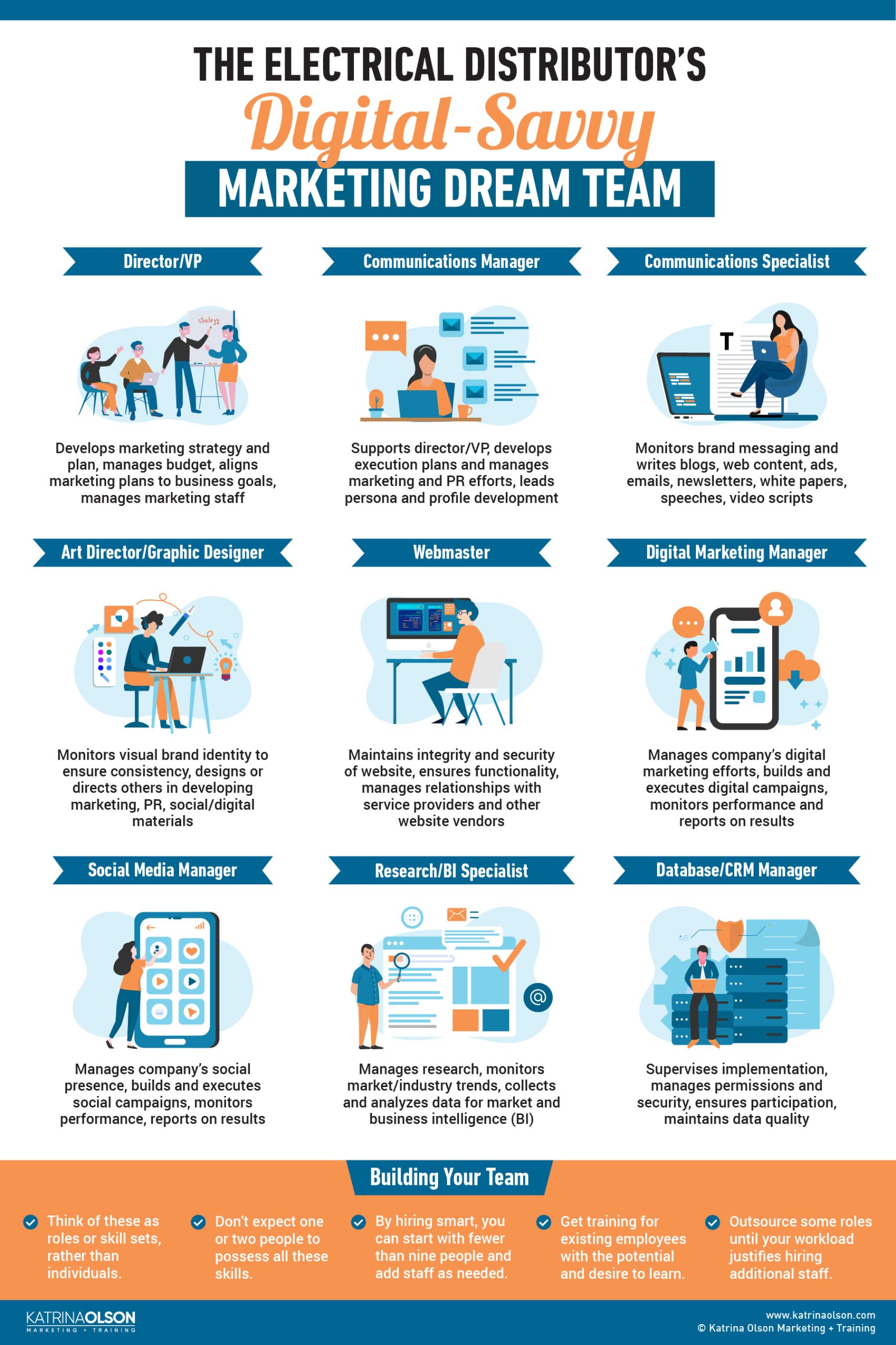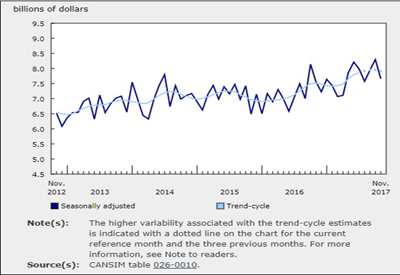Building Your Digital-Savvy Marketing Dream Team

July 25, 2019
By Katrina Olson
How would you describe your marketing team? Is it an army of one or significantly understaffed? Are your marketing people overworked and underpaid? Are they struggling because they’re underqualified or undertrained?
As more and more distributors and manufacturers rethink how they use technology, people and processes to change the way they do business (i.e., “digital transformation”), digital marketing is no longer optional. And it is too complicated and time-consuming for one person to learn and manage.
Should you build your team first, then ramp up as quickly as possible? Do you start by training your existing marketing staff or do you hire new people—or some combination of both? Do you outsource, use freelancers, or hire temporary staff? Or (my favourite), do you steal them from other industries?
It’s enough to make your head explode.
In recent years, technology has made it easier to quantify the effects of marketing expenditures, but marketing is still not pure science. It’s experience, judgment, intuition, acumen, planning, technology, and of course, art. That’s a tall order that probably can’t be filled by only one person.
As marketing becomes more multi-faceted, it takes a strong team — even if that team starts with just a few people. It starts with a marketing leader who can articulate and achieve a vision, is ambitious enough to learn and grow, and knows how to find and hire people with the right skill sets.
Qualities of a strong marketing leader
Leading a marketing department in 2019 is much more difficult than it was ten, or even five, years ago. Today’s marketing leaders need a unique and broad set of personal and practical skills.
A strong marketing leader is
• relationship-driven to ensure trust and cooperation among department leaders, internal clients, and the marketing team
• customer-driven and able to keep the marketing team focused on the customer at all times
• an effective delegator, involving everyone on the team based on their strengths, which also helps them manage projects efficiently
• a big-picture, strategic thinker with a vision for the future who effectively communicates that vision to their team
• decisive without overthinking a situation or overworking a problem, and occasionally able to use their intuition and experience to make decisions without knowing all of the information
• passionate about the company, its products, and what they do, and inspiring to others who are working toward the same goals
• innovative about attracting, maintaining, and growing customers
A marketing leader must also possess practical skills, such as
• being familiar with digital technology, including current platforms and tools
• paying attention to market and marketing trends to plan for the future
• being able to formulate and execute marketing plans
The marketing department’s job is to support the organization’s goals using all the tools at its disposal. Therefore, marketing leaders must also be business people who understand sales, operations, and finance so they can speak to other company leaders in their language when necessary to set goals, manage projects, and resolve conflicts.
Add in some courage to face obstacles, determination to push through trying times, tenacity to defend your recommendations, and patience when the wheels turn too slowly.
Qualities of a strong marketing team
Marketing leaders must build a team of highly competent specialists to manage the ever-growing channels, opportunities, and activities associated with digital transformation. The company, the marketing department, and individual team members will all benefit from the following:
• clearly defined (supportive) roles. Team members have clearly defined roles and responsibilities and know what is expected of them, but ideally can cover for one another as needed.
• strong internal and external communication. Marketing communicates effectively within its department, with other departments, and with customers, vendors, and the media. As a result, questions are answered, feedback is shared, deadlines are met, and goals are achieved.
• a culture of knowledge sharing. Team member document their processes and knowledge, easing transitions when team members are promoted or leave the company. Staff are cross-trained and team-oriented; they share what they learn at workshops, conferences, and classes.
• mutual respect and trust. Team members are valued for the unique contributions. They feel acknowledged and respected; they trust each other and hold each other accountable (in a good way). They’re able to set aside differences and manage conflicts, in a positive environment.
• adaptability. Marketers learn new strategies, tactics, and platforms to adjust to the rapid speed at which technology is changing marketing tools and processes. They’re constantly learning—often by trial and error—and their bosses understand experimentation and mistakes are part of the learning process.
• clearly defined goals and expectations. Expectations and goals for the team’s work are clearly defined and understood by both employees and managers before any project begins. Goals are S.M.A.R.T.—specific, measurable, attainable, realistic, and time-sensitive.
• revenue-focus and accountability. To demonstrate how marketing directly impacts revenue and to encourage collaboration, marketing shares accountability with the sales department, going beyond metrics like brand value and impressions, which are no longer enough to validate marketing’s efforts.
• customer focus. As the voice of the customer, marketing shares insights that inform corporate strategy. Marketing helps identify market opportunities, relays customer expectations, and demonstrates the value the company and its products provide to customers.
Okay, now that you know how a strong marketing team operates, you’re probably wondering what this marketing dream team looks like?
Your marketing “dream team”
I’ve used a version of this information in many presentations and training sessions, but I recently updated it to reflect a more digital-savvy team. Following are the key roles that must be covered to create a highly functioning marketing team:

• Director/VP — develops marketing strategy and plan, manages budget, aligns marketing plans to business goals, manages staff
• Communications Manager — supports Director/VP, develops execution plans and manages marketing/PR efforts, leads persona/profile development
• Communications Specialist — writes content for digital, social, and traditional media including advertising, marketing and PR content
• Art Director/Graphic Designer — monitors visual brand identity to ensure consistency across all media/platforms, designs marketing materials
• Webmaster — maintains integrity and security of website, ensures functionality, manages relationships with service providers
• Digital Marketing Manager — manages company’s digital marketing efforts, builds and executes digital campaigns, monitors and reports on results
• Social Media Manager — manages company’s social presence, builds and executes social campaigns, monitors and reports on results
• Research Analyst/Business Intelligence (BI) Specialist — manages research, monitors market and industry trends, collects and analyzes data
• Database/CRM Manager — supervises implementation, manages permissions and security, ensures participation, maintains cleanliness
As you build your team, think of these as roles or skill sets rather than individual employees. By hiring smart, you can find candidates who can serve two or three roles. Or, if you already have employees with potential, you can train them to assume additional roles. And if you can’t hire or train, consider outsourcing a few responsibilities. No matter how you do it, it’s time to start building your digital-savvy marketing dream team.
Katrina Olson is a marketing consultant, trainer/coach, speaker, columnist, and content developer. She also helps companies build high-performing marketing teams. Katrina is the host of the Market Boldly podcast available on iTunes, Google Play, and at KatrinaOlson.com. She can be reached at Katrina@KatrinaOlson.com or via her website at www.katrinaolson.com.











